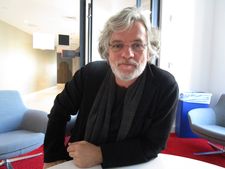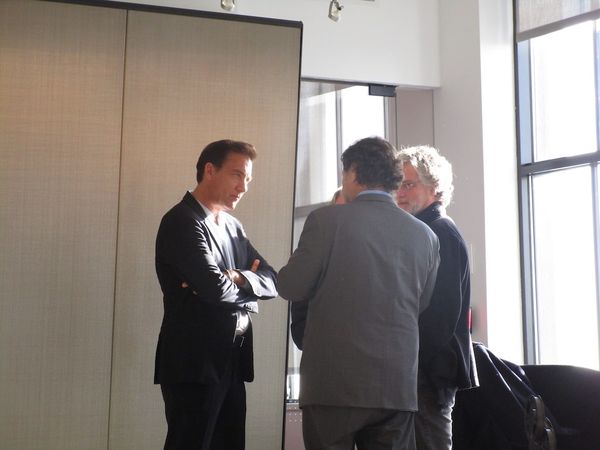 |
| The Song Of Names star Clive Owen with producer Robert Lantos and director François Girard at Sony in New York Photo: Anne-Katrin Titze |
François Girard’s The Song Of Names, based on the novel by Norman Lebrecht, screenplay by Jefferey Caine with a score by Howard Shore is produced by Robert Lantos, Lyse Lafontaine and Nick Hirschkorn, and stars Tim Roth and Clive Owen with Catherine McCormack, Jonah Hauer-King (Prince Eric in Rob Marshall’s upcoming The Little Mermaid), Luke Doyle, Gerran Howell, Misha Handley, and Eddie Izzard.
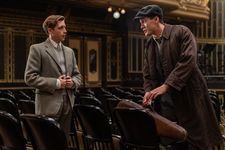 |
| Martin (Gerran Howell) with Dovidl (Jonah Hauer-King) in The Song Of Names Photo: Sabrina Lantos |
From what Ed Bahlman calls the 'fantastic' documentary Thirty Two Short Films About Glenn Gould to The Red Violin (Oscar to John Corigliano for Best Original Score), starring Samuel L Jackson, Greta Scacchi, Jason Flemyng, Carlo Cecchi and Sylvia Chang, François Girard is no stranger to films centered around music. In The Song of Names, little nine-year-old Dovidl Rapoport (Luke Doyle), a violin prodigy from Warsaw, is taken in by the family of a music publisher in London. The Second World War is looming, which at first doesn't make much difference to Martin (Misha Handley), who now has to share everything with this new intruder, who seems to be rather full of himself.
Soon the two boys become very close. Dovidl's family remains in Poland and their fate under the Nazi regime is unknown to them in England. After the war, at age 21, when Dovidl (Jonah Hauer-King) is about to give his debut concert, a number of actions, playing with coincidence, fate, and betrayal, separate the two young men.
Only in their fifties, Dovidl and Martin (now portrayed by the third duo of actors, Clive Owen and Tim Roth) will some of the mysteries be revealed. A song is at the center of everything. The Song Of Names is a film of two brothers who aren't brothers and more than brothers, and of a song that isn't a song, but memory itself.
Anne-Katrin Titze: First I have greetings to you from Ed Bahlman of 99 Records who produced Glenn Branca’s first two recordings, the Lesson No. 1 EP and The Ascension album. He wanted me to tell you that he thinks Thirty Two Short Films About Glenn Gould is fantastic.
François Girard: It was as well a Sony project.
AKT: It was?
FG: Because Glenn Gould was a CBS artist. This is how I entered the Sony world. And then Sony financed and released the soundtrack of Red Violin. So I was in the Sony family.
AKT: I just spoke with Robert Lantos about the fact that this project, The Song Of Names, needed someone who could capture music as well as cinema, who had both at his fingertips. And that was you.
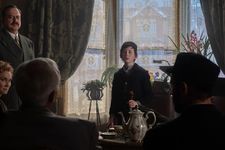 |
| François Girard on Luke Doyle as Dovidl: “Never seen a camera before.” Photo: Sabrina Lantos |
FG: That's the main reason why Robert [Lantos] came to me. But I have to say if I look at my challenges with this film - the music, yeah, it was there and it needed to be dealt with. And I had the greatest possible companion in Howard Shore. It was never like an overwhelming challenge. It was complete understanding from the beginning with Howard and went smoothly to the end with Howard producing the most amazing music.
AKT: You together were coming up with this piece of music that makes people wonder "why don't I know this?" Although it is a total invention for the film.
FG: Yet it had to be really true to the Jewish liturgical music, cantorial music. Right from the top Howard and I were in complete agreement that there's no cheat. Howard for a year and a half had been researching before he actually wrote The Song of Names. It's a strange feeling, when you listen to it it does feel like it's part of a repertoire, like it's not a new piece. It's completely Howard Shore, at the same time it's completely true to the reality of a synagogue in 1952.
 |
| Tim Roth as Martin at Treblinka in The Song Of Names Photo: Sabrina Lantos |
AKT: The six actors may have been more of a challenge for you?
FG: Exactly.
AKT: You are not Martin Scorsese, who might age the boy, or de-age the older actors [in The Irishman]. Well, it might not have been possible with a child of nine.
FG: Ten, Luke [Doyle] is 12, playing ten. But, yeah, that was the real challenge, you said it before me. Reading the script for the first time, you see the two leads, Dovidl and Martin, played by three actors each. Actually, there was a suggestion of four at one point. And I said "No, give me a break!" So then we re-wrote the script so that it works for three.
First there was a lot of effort in the script to make the flow work for three actors. And then you have to find three actors, which was a one-year balancing act. Because it had to work vertically, the two trios. But you have three pairs, so the kind of chemistry you have between Clive and Tim, you have to find in the middle ones and the young ones. You take one out and you replace them and it doesn't work - so it was really like a puzzle.
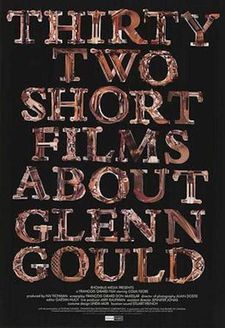 |
| François Girard’s Thirty Two Short Films About Glenn Gould poster |
AKT: The dynamics between the two are interesting. From little Martin's perspective, there suddenly is this boy who takes over his family. He takes away his father in some respect.
FG: Yeah, this is the film. I just started to think, is there any scene where none of the six are in. There's one solo scene with Helen [Catherine McCormack], but they are sort of always there. It's the two leads in three ages.
AKT: You have some interesting mirror scenes. The two boys under the bridge, in the ruins during the war is mirrored later on in New York when they are in the car under the bridge.
FG: That's interesting that you see it. Very few people would see that.
AKT: He's driving there automatically, as if they were going back to their old hiding place a continent and decades away.
FG: You can do a lot of things, work the hair, the costumes, but ultimately, it goes into the energy and the soul of the actors. My main focus from day one was to make those six work together.
AKT: So you had Clive Owen and you had Tim Roth when it started?
FG: We started with Clive, then Tim, then found middle and the young ones. Jonah Hauer-King, for instance, obviously is just about to bloom. He will be a star and he's actually just been cast in the lead of a huge Disney production.
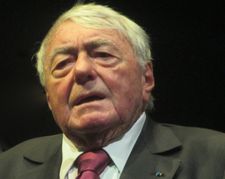 |
| The Last Of The Unjust director Claude Lanzmann Photo: Anne-Katrin Titze |
AKT: Which is?
FG: The Little Mermaid. You're going to see Jonah Hauer-King a lot in the future, because he's got everything.
AKT: Luke Doyle impressed me very much, not just with his violin.
FG: Never seen a camera before.
AKT: The way he holds his head! The body language is fantastic.
FG: The Dovidls worked a little harder than the Martins. They had to do this Polish accent and there's a lot of dialect coaching. And the two older ones had to learn to play the violin. They're accomplished actors who need to learn to play the violin and then the younger one is an accomplished violinist who needs to learn how to act. It was a very steep learning curve for Luke.
AKT: One date I was wondering about. June 15 is an important date in the film. Is it random? It's one day before Bloomsday. James Joyce?
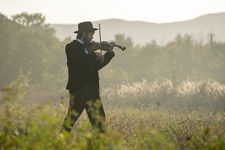 |
| Jonah Hauer-King as Dovidl at Treblinka in The Song Of Names Photo: Sabrina Lantos |
FG: I actually never heard that questioned. That is a Jeffrey Caine creation. That lady [Anna] doesn't exist in the book. He might be able to answer better than me.
AKT: When Dovidl takes the bracelet from the dead woman is a very strong, disturbing scene. I don't remember seeing a similar scene - a character like him doing this, and keeping in mind always of course the thought of everything that has been taken away from him.
FG: It's interesting, I remember us questioning how. It's very efficient to show the arrogance of Dovidl, but the good thing is that in the next scene he provides a really good answer. He says "Everybody's dying. Tens of thousands of people died last night. Am I supposed to worry just about this one lady?" He makes a really good point and saves himself from harsh judgement. I consider this Luke's best scene.
AKT: Yours was the first fictional feature to film at the memorial in Treblinka.
FG: First of all, we were prepping this whole thing, the [production] designer François Séguin and myself. We've never been there. Before we got to Europe we would sidebar that scene. I didn't know how to film this. There was a question that we would do green screen. Then during prep there was a day when François and I needed to go and see. I read a lot, even before I started this film, about those camps.
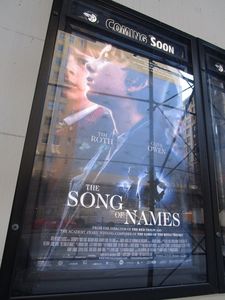 |
| The Song Of Names poster at Angelika Film Center - opens on December 25 in New York Photo: Anne-Katrin Titze |
We fly to Warsaw and in the last two three days before I go to Treblinka, I see an extra layer of documentaries. It's horrific. Everything's horrific, I was in Hiroshima two weeks ago. Those events challenge the comprehension. But Treblinka - there's a mechanical precision in the killing of 30,000 people a day. Eventually they had to stop because there were some flaws in the chain and redesign the thing. They started again and it was more efficient. This completely deliberate killing machine. I'm loaded with all that. And in the car I was like …
AKT: You didn't want to go there.
FG: I don't feel like it … And I arrive there and there's 300 kids with white T-shirts. And they're flying kites and they're playing guitar and they're having picnics and it's a celebration of life right in the place of death. And it gave me a big relief. We walked around for two hours. None of us said a word. We were three, with the actress who plays Anna [Magdalena Cielecka].
We didn't talk to each other. I said that's it. We're going to film there, Jeffrey, we're erasing all the dialogue, no one talks, there's nothing to say. I knew that once I'd been there. Then I had to write long letters explaining the nature of the project to the authorities of Treblinka and eventually we got the permission.
AKT: The presence speaks for itself. I had to think of Claude Lanzmann in the present, that is, a few years ago before he died, filming in Theresienstadt, standing on the platform at the train station for The Last Of The Unjust. No staging can equal that impact. The past living in the present space as memory.
FG: Yes, that’s it.
Read what Howard Shore had to say on The Song Of Names, The Aviator and A Dangerous Method.
Coming up - Howard Shore on recording the score for The Song Of Names with the Orchestre Métropolitain in Montreal, Judith Clurman, Daniel Multu, Paganini and Ray Chen, and a conversation with The Song of Names producer Robert Lantos.
The Song of Names opens on December 25 in the US.











